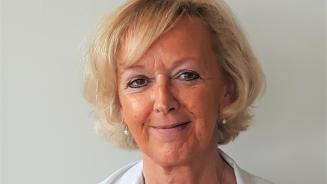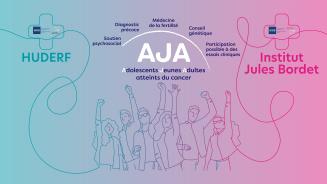World Pediatric Cancer Day - Interview
On the occasion of World Pediatric Cancer Day, we present to you an interview with Dr. Devalck, Director of the Hemato-Oncology Department at the Children's Hospital.
On the occasion of World Pediatric Cancer Day, we had the opportunity to interview Dr. Christine Devalck, Director of the Hemato-Oncology Department at the Children's Hopsital, an integral part of the Brussels University Hospital. We discussed the current state of pediatric cancers in Belgium, upcoming priorities, and the new AYA (Adolescents and Young Adults) reference center at the Jules Bordet Institute and the Children's Hospital.
Q: Dr. Devalck, could you please provide a brief overview of the Oncology Department at the Children's Hospital (Huderf)?
Dr. Christine Devalck: The Oncology Department at the Children's Hospital is dedicated to providing comprehensive medical care to children with cancer. Our priority is to offer the most effective treatments in accordance with international guidelines and to improve the quality of life of our patients by implementing measures to mitigate the daily impact of the disease and facilitate the transition between the hospital and home. Additionally, we provide psychological, social, and nutritional support to ensure comprehensive care.
Our facility is recognized as a reference center in pediatric oncology, and our team consists of highly specialized professionals. We maintain close collaboration with other national and international healthcare institutions while being actively involved in research and development. We participate in clinical studies aimed at providing our patients with access to the latest and most innovative treatments available.
Q: Dr. Devalck, could you give us an overview of the current situation of pediatric cancers in Belgium?
Dr. Christine Devalck: In Belgium, we have been witnessing a positive evolution in the management of pediatric cancers for several years. Medical advancements in recent years have significantly improved the chances of recovery for children with cancer. Survival rates are increasing, largely due to advancements in treatments and a better understanding of the diseases.
One of the current priorities in pediatric oncology is to emphasize the quality of life of children with cancer
Q: However, it is essential to note that despite these advancements, there are still significant challenges to address. Could you elaborate on this?
Dr. Christine Devalck: One of the current priorities in pediatric oncology is to emphasize the quality of life of children with cancer. Traditional treatments such as chemotherapy and radiotherapy, while effective, can lead to severe side effects that can significantly impact the lives of young patients. We are actively seeking ways to reduce these side effects while maintaining high cure rates.
Q: Could you discuss therapeutic advances that are improving treatment outcomes for children with cancer?
Dr. Christine Devalck: We are witnessing significant advancements in pediatric oncology treatments. For example, targeted therapy allows us to personalize treatments based on the specific characteristics of each child's cancer. Immunotherapy, which stimulates the immune system to target cancer cells, also holds great promise. Additionally, cellular therapy, including hematopoietic stem cell transplantation, is a crucial option for treating leukemia.
Q: Early detection awareness of pediatric cancers is also crucial. Could you explain why this is so important?
Dr. Christine Devalck: Early detection of pediatric cancers is vital because these diseases can develop rapidly. The earlier we can diagnose and treat cancer, the better the chances of recovery and the fewer long-term consequences. General practitioners play an essential role in this process by quickly identifying suspicious signs and symptoms in children.
The AYA Reference Center
Q: Dr. Devalck, could you explain how the establishment of the AYA Reference Center (Adolescents and Young Adults) at the Jules Bordet Institute and the Children's Hospital represents a significant advancement in the care of adolescents and young adults with cancer?
Dr. Christine Devalck: The AYA Reference Center is specifically designed to meet the unique needs of this particular population. Adolescents and young adults face specific challenges, particularly in terms of psychosocial, emotional, and medical aspects, and the AYA center aims to support them comprehensively.
Q: Could you explain how this center addresses the specific needs of adolescents and young adults with cancer?
Dr. Christine Devalck: Adolescents and young adults with cancer are at a crucial stage in their lives, where they are seeking to assert themselves, build their identity, and pursue their education or career. Cancer can disrupt their daily lives and life plans. The AYA center provides an environment tailored to this age group, with specific psychosocial support to help them cope with the emotional impact of cancer.
Q: Regarding the medical management of cancer, what are the therapeutic challenges during this transition to adulthood for patients?
Dr. Christine Devalck: First and foremost, it is important to note that the types of cancer in adolescents and young adults may be different from those observed in children or older adults. Therefore, the transition often involves a change of specialist or collaboration between multiple specialists, which may necessitate adjustments in medical management.
Additionally, due to the desire for independence and the aspirations of adolescents and young adults to live a "normal life" despite cancer, this may require an approach more focused on autonomy and respect for the patient's choices, while ensuring appropriate follow-up of treatments.
Q: How does the AYA Reference Center contribute to the transition to life after cancer?
Dr. Christine Devalck: Transitioning after cancer is a crucial step for adolescents and young adults. The AYA center helps plan this transition, including resuming education, career, social relationships, and daily life. This preparation is essential to help them fully reintegrate into society after cancer, offering promising prospects for their future.
For more information on the AYA Reference Center

